Gareth Southgate’s secret weapon ‘Helix’ and the key message to England players
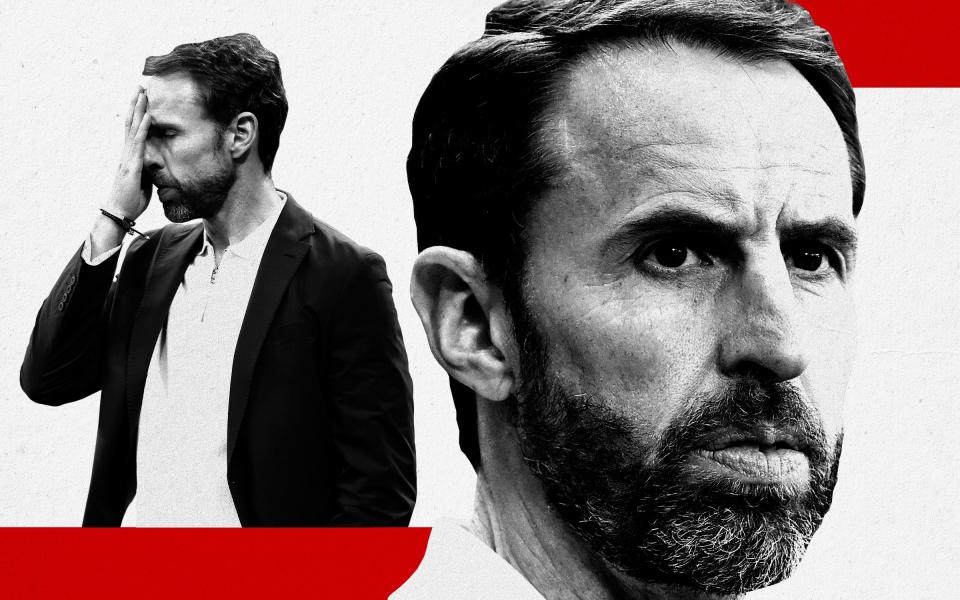
Thinking it was over after Qatar
When the chartered Virgin Atlantic plane, named “Rain Bow”, took off from Doha the day after England were knocked out of the World Cup in the quarter-finals against France, the general mood was sombre and clear: it was over for Gareth Southgate. He was going.
There was an expectation, among his staff and within the Football Association and those on board the A350 aircraft which was flying the squad back to Birmingham, that the England manager would now step down. Logically it felt the end point had been reached.
Southgate had not yet said anything or discussed his future but that was the over-riding feeling amid the frustration of having lost to France; a game they thought they could – and should – have won.
FA technical director John McDermott would later tell the story of sitting on the steps at the Al Bayt Stadium with France captain Hugo Lloris, who he knew from working with him at Tottenham Hotspur, and who admitted: “Wow, we were on the rocks there.”
Within a week, as Telegraph Sport revealed, Southgate had decided to stay and go again for the 2024 European Championship. Crucial to that decision was the reaction to England’s exit. Before the World Cup started Southgate had privately resolved to leave, believing there was too much negativity around him and that it could inhibit the team.
That stemmed back, in particular, to England’s disappointing Nations League campaign the previous summer and certainly the hostility following the embarrassing 4-0 home defeat at Molineux by Hungary that unnerved Southgate to such an extent he was asking himself whether he was now the problem rather than the solution.
If there had been further widespread criticism after the France game it would have confirmed the decision in his mind. Except the reaction was different and far more positive. Certainly the players, led by captain Harry Kane who later spoke to Southgate on the phone, made it clear they wanted him to stay although the general feeling was he needed time – possibly over Christmas – to process it.
In the end his mood lifted far more quickly after talking to his family back in North Yorkshire with a relieved FA able to confirm his decision a week after the World Cup loss. Southgate had the belief that he wanted to go on to the next one.
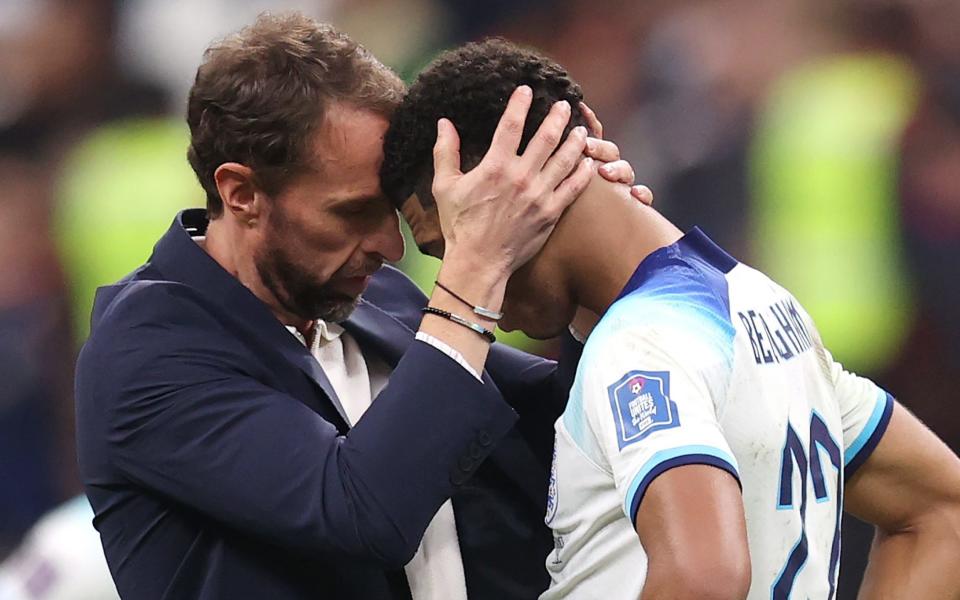
‘We are on a journey’
Southgate is big on building evidence. It is interesting listening to him recently comparing international tournament football to the Champions League. Sometimes – as with Manchester City winning it last year and Chelsea in 2012 – it takes a series of near misses before the goal is achieved.
With England, Southgate believes the team is now consistently challenging with a core group of players who are used to getting to the business end of tournaments. Built on experience and the reality of achievement they expect it. It is partly why Southgate talks about winning it and not just doing the best England can. The dynamic has shifted and the familiarity they feel is a plus.
There is no point talking about getting to quarter-finals as a minimum requirement or ‘par’ for a tournament as used to happen. England are beyond that.
But there always must be evidence to back that up. If England are to triumph in Germany they are going to have to do something they have never done before: reach a final overseas. In the 1966 World Cup and the last Euros tournament the finals were at Wembley.
So, winning away to Italy, for the first time since 1961, which England then did in their opening qualification tie for the Euros in March last year was another key piece of evidence to build belief. It was not an easy group with Ukraine also in it. But the impressive 2-1 victory – with Kane scoring in Naples to become the nation’s record all-time goal-scorer and England playing almost the entire game with 10 men after Luke Shaw was sent off – convinced Southgate even more that he had the players with him.
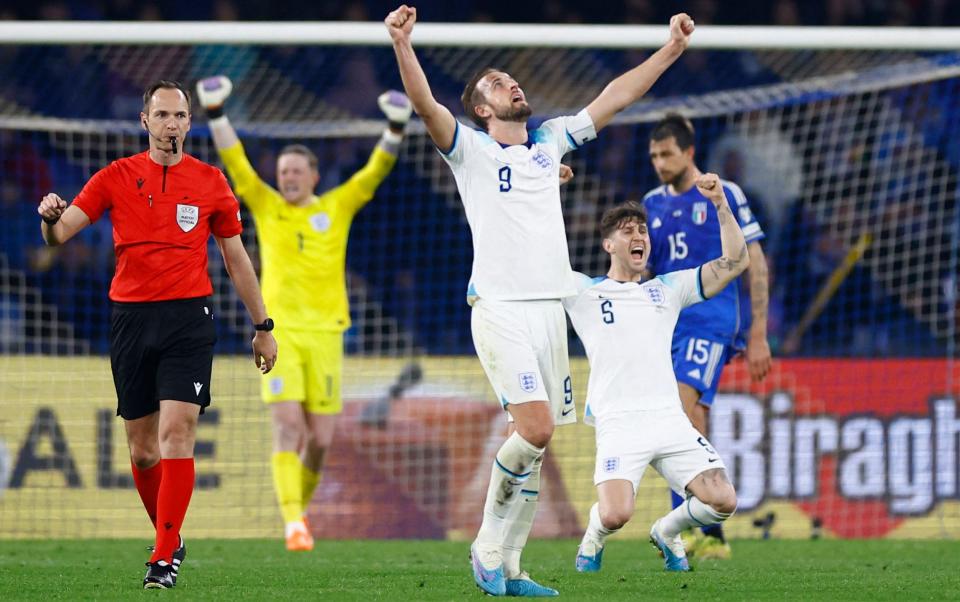
His argument? Frankly you do not pick up those kind of results – certainly not in the first game after going out of a tournament – if there are any doubts. It was the first time Italy had lost a home qualifier since 1999.
“We’re on a journey,” is what Southgate told the players in their first get-together at St George’s Park after Qatar and he sensed the motivation in the room. The ball was rolling again. Everyone knew that success is not a switch that can be flicked but they sensed that England are getting close and winning in Italy confirmed that.
England’s secret weapon: Helix
There is a bespoke system that England have recently developed to keep an eye on all their players. They used to buy a package called Hudl but now they have Helix, their own software, and it allows Southgate and his assistant Steve Holland to watch any game they want to watch live, wherever it is in the world and even if it is not covered by television.
It means that Holland can attend Manchester United against Arsenal, as he did at Old Trafford on May 12, and then can watch the entirety of Ajax’s home game against Almere City to check on Jordan Henderson, who eventually was ruled out of the squad through a lack of sharpness. But Southgate gave the midfielder every chance to make it. They watched all his matches last season in the Netherlands and, before that, in Saudi Arabia.
The game is viewed on a widescreen that shows the whole of the pitch. It is as if Holland or Southgate are there in the stadium. They get a tactical view, not a TV view, and the system is quick.
Helix is another example of the attention to detail that the pair demand. They have been with England for eight years and fastidiously treat it like a club job. They have that work ethic and talk every day; attend up to three games a week and hold detailed debriefs. After Southgate went to Aston Villa’s 3-3 draw with Liverpool he called his assistant at 10pm and spent an hour on the phone, discussing what he had seen.
Why do they go to so many games? It is an interesting point. Picking an England player is not just about ability or tactics. It is the insight that can be gained from being at the stadium – how does the player emotionally or mentally handle playing away from home, compared to being at home? How does he deal with a hostile crowd? What happens if he is asked to play in a different position? And, crucially, what is he like on the bench and how does he react to being substituted?
The biggest single power Southgate has is selection and, interestingly, he has talked about the danger of allowing “complacency” to creep in. He has been determined to keep his options open for “fresh blood” and has, ultimately, gone for it with this squad and not least with bringing in midfielder Adam Wharton.
Southgate is determined to avoid a situation where players feel they have just got to turn up to play, especially as he has been there so long. They need that bit of fear to give that extra percentage point.
The manager does not have the players every week, as clubs do, so must work harder to find out about their personalities and characters. It makes the profiling even more important to gain added insight. So, what England do is build not just a technical report on every player who is scouted, but a mental one which goes back to the old adage that not everyone wears the Three Lions shirt lightly.
England’s ‘super strength’
When Southgate travels to matches and talks to fans he is always told the same thing: he must unleash England’s incredible attacking options. He intends to. But not, necessarily, the way people expect. It is why mentally profiling players to see how they react to being on the bench or substituted is something Southgate and his assistant Holland are big on.
That is because in Germany Southgate wants, as much as he can, to utilise all five substitutions that will be permitted in games. He believes this will be England’s “super-strength” – having forward players in particular who are interchangeable and will have an impact when they come on. In some positions England have three players who are at a similar level so that must be taken advantage of.
Southgate is excited by the choices available to him in the attacking areas and he has therefore been bold in his squad selection. He has gone for young players in form and jettisoned Marcus Rashford, Jack Grealish and James Maddison who are more experienced and bigger names but have not been playing well.
Cutting that squad was emotionally draining for Southgate. Maybe with hindsight he should not have named an original, provisional 33 but the fitness issues were so complex and daunting he felt he needed to and his reasoning was sound. And yet he also felt the need to address those who remained at Spurs Lodge – where they were staying – last Thursday about his choices and the effect it has had on the atmosphere.

Southgate wants to hammer home the message that the team that starts a game cannot expect to finish a game. That is the way of modern football, anyway, but the squad needs to buy into the “power of the collective” and Southgate wants that to be evident during the tournament. He intends to use that super strength.
The problem is not all players grasp that. Not yet anyway. One of the key talks he will have with his squad in Germany is to point out that football, unlike golf or tennis, is a team game and that team extends beyond the 11 on the pitch. The fact the players are familiar with a large number of subs being used with their clubs will help.
But the need for everyone to be on the same page and be ready for when their moment comes has never been greater and maybe that is aided, too, by choosing several players for whom this is their first tournament. After all, only 13 from the 26 who went to the last World Cup are in Germany. It may add an edge.
The case for the defence and three-and-a-half match-winners
If attack is a strength then defence is, unfortunately, a weakness for England. In the penultimate weekend before the Premier League season ended six of the nine defenders Southgate took to Qatar did not play a single minute. Kyle Walker, John Stones, Harry Maguire and Luke Shaw – the first-choice back-four – were all absent, as were Kieran Trippier and Conor Coady. Only Eric Dier, not selected, and Ben White – who has ruled himself out of being picked for England – played, while Trent Alexander-Arnold is now classified as a midfielder.
Southgate has his ‘batting order’ of who he wants to pick but that is rendered redundant if players are not available and the loss of Maguire is a huge blow.
Southgate is grappling with getting his combinations right. And for all the clamour there is for playing more attacking players, there is also a general formula to picking a team that wins tournaments which he is well aware of.
It was the case with Argentina in Qatar, with Italy at the last Euros, with France at the 2018 World Cup, with Portugal at Euro 2016 and on and on.
Firstly, these teams all had a solid defensive base. Usually they also had two defensively-minded midfielders and another who has that as part of his duties. It means most teams then have what is known as ‘three-and-a-half matchwinners’ in their XI.

What Southgate and Holland have also found interesting is that despite this being a record-breaking season in terms of the number of goals being scored in the Premier League, since the turn of the year the two most successful teams – Manchester City and Arsenal – have been particularly strong defensively. Arsenal’s performance in winning 1-0 at home against Manchester City and the goalless draw they achieved at the Etihad are cited as examples. As is City’s 2-0 win against Tottenham Hotspur when they adopted a pragmatic, defensively-stable approach.
Nevertheless, Southgate is veering towards something a little bolder with Alexander-Arnold favourite to partner the increasingly influential Declan Rice, already earmarked as the next England captain, in the centre of midfield against Serbia. Southgate reasons that it will help unlock England’s attack even more although he also, with justification, has argued that he has never held it back given the number of goals scored under him.
Not everyone must be fully fit
When he was a player Southgate endured the endless dramas around England taking unfit players to tournaments with the word “metatarsal” suddenly in the sport’s lexicon as the nation traced whether David Beckham or Wayne Rooney would make it to subsequent World Cups.
Inevitably it made him very wary of falling into the same trap. Except experience has now led to a switch, especially given he has spent many hours in first choosing his provisional 33-man squad and then his final 26-strong selection, pouring over physical data and medical reports.
There have been more doubts than ever before and this has been the most difficult squad he has ever selected.
But it is also his fourth tournament and that has bred confidence that he knows what he is doing. In fact, only Sir Walter Winterbottom and Sir Alf Ramsey have taken charge of more games as England manager. Southgate is vastly experienced in this role and knows what he is doing.
So Maguire went to the last Euros even though he was unfit for the first two games, only to play a key role in the run to the final, and Walker was similarly unavailable for the opening two ties of the last World Cup. Unfortunately, though, Maguire was just too far behind to make this squad. And that is a big loss.
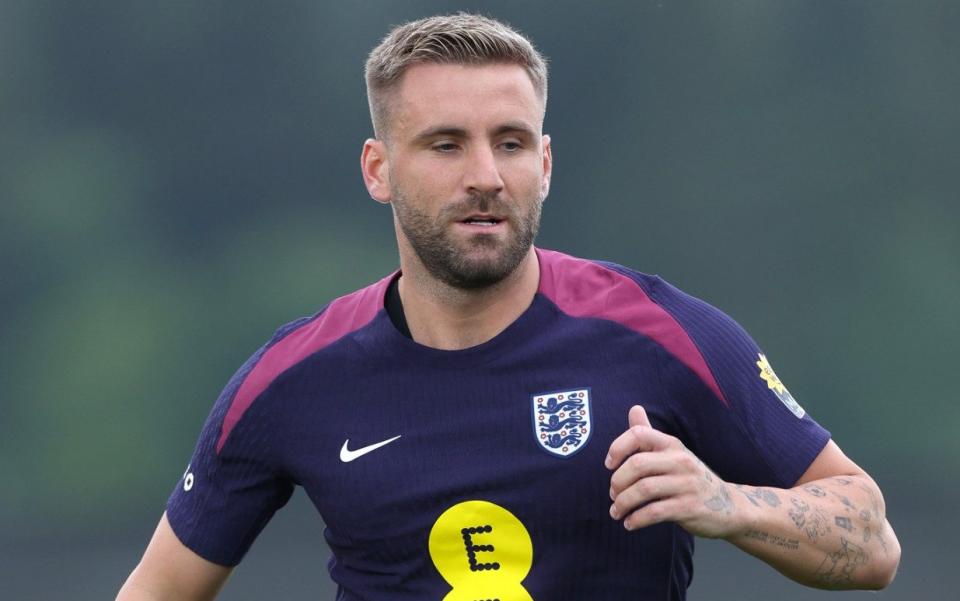
The expansion of the squads to 26 players undoubtedly helps but Southgate now believes he has a specific insight, through experience, of what is required for tournament football. Having gone through three tournaments, and knowing how to manage a squad, gives him the confidence to go against the grain.
Southgate knows the XI he wants to play in the opening group game against Serbia in Gelsenkirchen this Sunday and has done so for weeks. Whether he is able to field that team has been the concern.
The reality is there have been more doubts around this squad than ever before. And with just 10 training sessions available – six more than for the last World Cup but still not enough preparation time – it has made it even more difficult.
‘Que sera, sera’
Southgate was struck by the mood of the nation, and the effect the result had, when England beat Denmark to reach the final of the last Euros. It had a profound effect upon him and has been a driving force to carry on and try to finally win a trophy.
He has had three goes at it. Germany will be his fourth and, quite possibly, certainly if England do not win, his last. Southgate knows that and has always known that. He knows that England managers end in open-top bus tours or ignominy and there have been very few of the former.
Naturally, therefore, there has been a lot of talk about his future with his contract expiring at the end of the year.
The link to Manchester United has been made and understandably so given his profile and his relationship with Ineos and its director of sport Sir Dave Brailsford. But those close to Southgate are adamant he has not held talks about United. They say he believes to do so with a tournament to prioritise would have been completely disrespectful. Southgate is also president of the League Managers Association, a role that comes with being England manager, and takes that very seriously. He would not want to go behind Erik ten Hag’s back.
It is, it is said, not a decision of the brain but one of the heart. Southgate may come across as a very measured, calm character – and he is – but he is also an intensely emotional one and nothing matters more to him in football than England.
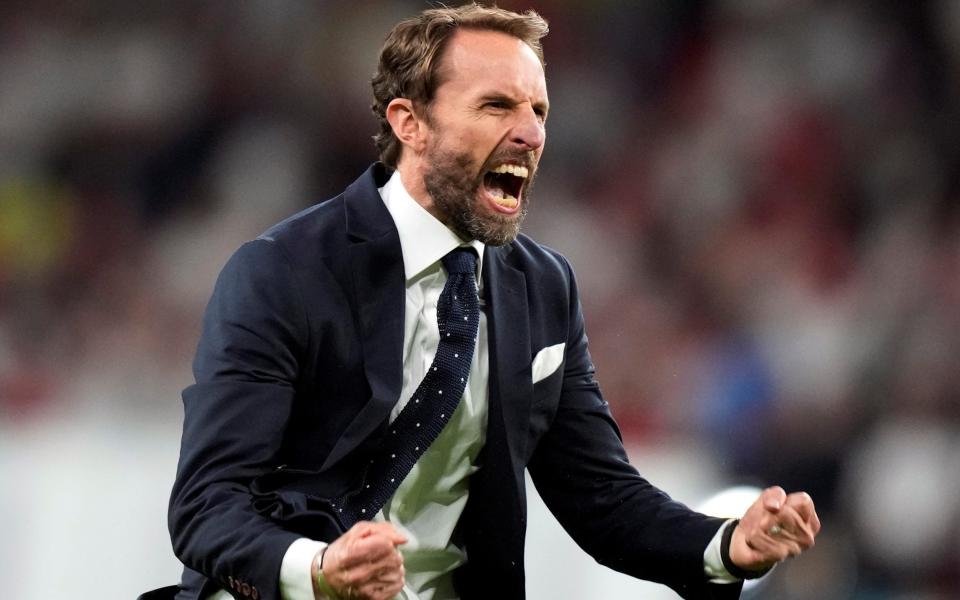
With that in mind he would never forgive himself if he allowed his future to distract him from the mission of trying to finally win a major trophy with his country.
Southgate knows what might happen in the next five weeks – hopefully – and he knows what it will take out of him. To allow any other thoughts, when he is carrying the hopes of 56 million people, would be wrong. Or so he feels.
That pressure and the highs and potentially the lows that come as a consequence – and the possibility of doing something that would give joy to so many – is something he feels acutely. It may sound corny but that is where Southgate’s mind is at: to be on the verge of that moment and to think of anything beyond that frankly is unimaginable for him. He knows it would not reflect well on him either if it happened. Imagine the reaction?
It means there has been a simple mantra when Southgate thinks about his future as the Euros begin: ‘Que sera, sera’. Whatever will be, will be. He wants to stay on. He dreams of taking England to the next World Cup as European champions. We will soon find out if that becomes a reality.

 Yahoo Sport
Yahoo Sport 






































